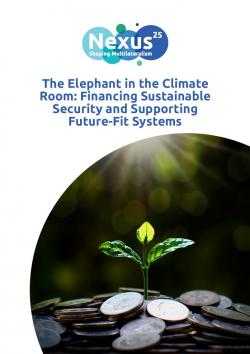The Elephant in the Climate Room: Financing Sustainable Security and Supporting Future-Fit Systems
This paper outlines the key challenges facing policymakers ahead of this year's “Spring Meetings” of the IMF and World Bank, particularly in the context of food security challenges, global instability, and gaps in climate finance. The gap in climate finance has implications beyond sustainable development and humanitarian need. Further, investments in climate adaptation and resilience are essential for addressing the security implications of climate change, helping reduce risks and vulnerabilities, and helping build more stable and secure societies. With these interrelated risks in mind, this year’s “Spring Meetings” of the IMF and World Bank should serve as an inflection point for international financial institutions (IFIs), multilateral development banks (MDBs) and other multilateral stakeholders alike: failing to replace outdated processes, improve access to finance for climate-vulnerable nations, and prove that investing in fragile contexts can work will leave those most at risk trapped in interrelated crises and threaten global stability. Recommendations for the path forward include: 1) reforming the international financial architecture to relieve the burden on FCV states; 2) mobilizing the private sector, developing strategies for managing risk, and adjusting the bias away from mitigation finance; 3) identifying successful interventions, particularly in FCV settings; 4) improving existing programs and leveraging areas of agreement.
-
Details
Rome, IAI, April 2024, 7 p.
The status quo: Key debates and challenges ahead
Towards tangible policy solutions
Next steps
Topic
Tag
Related content
-
Ricerca07/12/2021
Nexus25 - Shaping Multilateralism
leggi tutto



